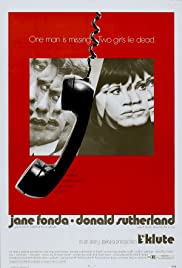
KLUTE
US, 1971, 114 minutes, Colour.
Jane Fonda, Donald Sutherland.
Directed by Alan Pakula.
Klute emerged as one of the best and most popular films of 1971. It appealed as a private-eye thriller, with Donald Sutherland an effective, although far from flamboyant, John Klute. New York settings gave an authentic environment to the film and the colour photography and music created an eerie atmosphere in the sordid side of a city's life.
However, the best thing about Klute is the performance by Jane Fonda. She is Bree Daniels, a cool, calculating call-girl, who does not operate in the best circles and is being searched out by a psychopath. Jane Fonda makes Bree live - in her fear for her life, in her being puzzled by the new experience of a growing love, something over which she finds she has lost the control she likes to have at all times. Most effective are the sequences with the psychiatrist where Bree talks to us and tells us candidly, sincerely and questioningly about herself. Jane Fonda won a number of awards, including the Oscar, for her performance. She is excellent and this role is even better than her Gloria in They Shoot Horses, Don't They? Klute is his second film as director. The first was The Sterile Cuckoo, a great success for Liza Minnelli. Klute can be recommended.
1. How does the film stand up as a private-eye thriller - interest, suspense?
2. Has Klute himself an important character? Why?
3. What kind of girl was Bree Daniels? How well did Jane Fonda communicate the personality of this kind of girl?
4. Comment on the techniques used in the film to show Bree as a real girl - calculated seduction, acting, watch-checking; Bree at home - her tawdry apartment, reading, smoking, meals; her audition for the part of Joan of Arc; her visits to the old tailor.
5. How did Bree fit into the New York world of vice? How well was this seamy background brought into the film?
6. Comment on Bree's explanations of herself in her interviews with the psychiatrist - as a call-girl, her needs, satisfaction, function, control of all situations, lack of nervousness compared with her clients; later, her loss of security in Klute's interest in her and love of her, resisting him and hurting him, her final acceptance of the new experience of love and dependence. What moral stances did she take?
7. How were the tape-recorders used in the film? How did they invade the privacy of people?
8. Why was Bree's speech about having no inhibitions and doing what one wanted constantly repeated and then ironically used against her?
9. What did the search for Alma show of the world of New York? What of Alma and her boyfriend? Alma's death?
10. How did the background music reinforce the atmosphere - especially the eerie theme for the murderer?
11. Why did Bree seduce Klute? Did she intend to and what was his response?
12. Why did the murderer play the tape of Alma's death? Why did he try to justify himself and explain himself as normal? How effective was Jane Fonda'$ acting in listening to the tape and her tears at Alma's death?
13. Was the ending convincing? Why did she go with Klute? What future did she expect? What future do you think she had?